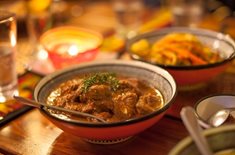
Cape Town is one of the world’s great crossroads. Two mighty oceans collide on its doorstep, and the vibrant second capital of South Africa is a melting pot of cultures, traditions, and, of course, flavors. Visitors to the region quickly learn what diehard foodies have known for some time: Cape Town is a culinary capital like no other!
It’s hard to know whether to refer to Cape Town’s food as “a cuisine” or “cuisines.” There are good arguments for each. The result of almost four hundred years of immigration, colonization, slavery, exile, and reconciliation, the foods of Cape Town are very much the product of pioneering ingenuity and creative experimentation. While each restaurant, cafe, and food truck is unique, Cape Town cuisine can be very roughly divided into three primary groups.
Afrikaans or “Cape Dutch:” The original settlers to South Africa were 17th century Portuguese explorers, but they were soon outnumbered by employees of the Dutch East India Company who established Cape Town as a strategic port on their spice route. Dutch and German homesteaders who came to be called “Afrikaans” soon followed, bringing with them a palate which would do much to shape much of Cape Town cuisine: a preference for blander flavors and a tendency to dress roasted meat and game in sweet sauces, flavored with the Company’s spices such as cinnamon, allspice, and most importantly, nutmeg. These are the accents of Afrikaans cuisine with its cured meats, sausages, and barbecues, as well as the national passion for beer and wine.
Indian or “Cape Malay:” This is a unique blend of flavors that is only found in South Africa. Cape Malay is a delicate marriage of convenience between the fiery spices of Indian laborers brought to South Africa in the nineteenth century and the blander Afrikaans palate. The spice is there, but tempered into something very different from Indian curry. Like Cape Dutch, Cape Malay puts animal protein at the heart of a dish including conventional beef and pork but also more exotic game, including the national favorite, ostrich. No traveler should leave South Africa without trying an ostrich burger or chew on a piece of biltong, or “ostrich jerky.”
African/Seafood: The temperate seaside climate of South Africa yields a bounty of grains, including maize, as well as fish and seafood, particularly prawns and oysters, and game of all kinds. Cape Towners are passionate about grilling and cooking over coal fires, so expect fresh meat expertly cooked, maize porridge as a starch garnish, and a uniquely Cape Town sauce that is spicy and sweet.
No culinary capital can really shine without wine, and Cape Town is justifiably proud of its award-winning regional vineyards in Cape Winelands.
Alexander+Roberts offers numerous tours to South Africa and Cape Town, from the twelve-day adventure
Three Wonders of Southern Africa to the independent exploration of Cape Town’s Wine Country,
Cape Winelands.